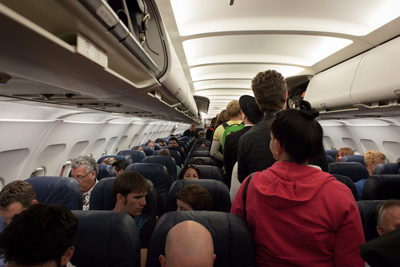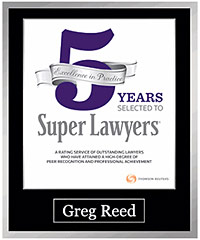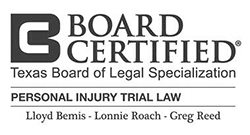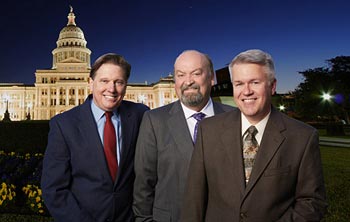TSA Screening and Flying with Disabilities
The TSA is working to help relieve anxiety over air travel for the disabled.
Author Attorney Greg Reed:
To ensure the safety of those who fly all travelers are required to go through a screening checkpoint. For those with disabilities the security check process can be intimidating and confusing so the Transportation Security Administration has some guidelines and suggestions for those with disabilities to help ease difficulties encountered during air travel.
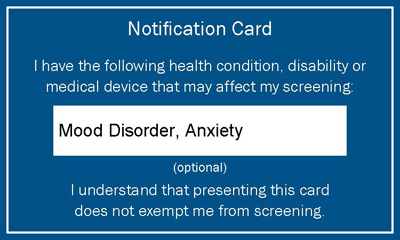
The Transportation Security Administration has guidelines and suggestions for those with disabilities to help ease difficulties encountered during air travel.
The TSA is committed to recognizing and respecting all people with disabilities and wishes to serve with respect and dignity.
The administration has introduced the TSA Notification Cards as an official and discreet way for travelers to inform security screeners of a disability. These cards can be used to record information about a disability and can be handed to the TSA officer when initiating the screening process. Any medical documentation can be presented as well as the notification card however a disability does not exempt a traveler from the screening process.
You should immediately inform the officer of any pain or medical complications that could result if touched.
If a passenger qualifies the usual TSA Pre check rules apply and you may inform the TSA officer at any time if you would like to move to the front of the screening line.
The TSA may swab your hands, mobility aids and other external medical devices to test for explosives or other security risks.
If you have disabilities or other medical conditions you do not have to remove your shoes, however your shoes will go through additional screening including visual and physical inspection. You can request to be seated during this examination.
Any oversized medically necessary liquids should be removed and will be allowed through the checkpoint after undergoing security screening.
Those with intellectual or developmental disabilities can go through the checkpoint without being separated from their traveling companions.
The traveling companion can discuss with the officer the best way to go about navigating any issues concerning the screening process. You may ask to go through the process in a private area.
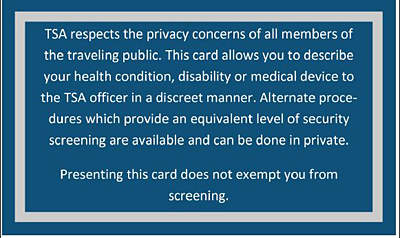
If you have concerns about your screening you can request to speak with a TSA supervisor or passenger support specialist at any point during the process.
If you have any external medical devices inform the TSA representative of the nature of the device and where it is located.
If the device can be safely disconnected and submitted for security screening do so, but if not, the area may require careful and gentle inspection. If you have an ostomy you can be screened without emptying or exposing the ostomy. The device may require additional screening and you may be required to do a self pat down of the device.
If you have internal devices such as an implant or an artificial joint advanced imagery has reduced the need for a pat-down inspection, however, devices such as a pacemaker should not go through metal detectors and you should consult your physician prior to flying.
If you do not wish to go through the advanced imaging technology or a metal detector a physical pat-down inspection will be required.
If you need to travel with medications proper labeling can greatly facilitate the process.
Inform the TSA officer of the medications and separate them from your other belongings before the screening begins. Medications will need to go through visual or x-ray screening and may be tested for traces of explosives. Declare any freezer pack, IV bags, pumps or syringes. You can fly with any medically necessary liquids or creams but you will need to remove them to be screened separately from the rest of your belongings. If a liquid or cream cannot be x-rayed and cleared for travel the container may need to be opened and a small amount removed.
Wheelchairs and scooters will be screened including pouches and seat cushions.
If you cannot walk but can stand a you will undergo a pat down screening near your device. If you cannot stand or walk you will go through the pat down screening seated.
Inform the TSA representative if you have a prosthetic, cast, brace or support appliance and require assistance in screening.
Prosthetic devices can be screened using imaging technology, metal detector, or a pat-down but you may be required to adjust your clothing to facilitate the screening process. If necessary you can be moved to a private screening location if sensitive areas are to be examined. You can also remove your prosthesis, cast or brace and have it screened by x-ray.
If you are traveling with a portable oxygen device you will need to contact the airline as not all airlines allow the use such devices.
You may also need to consult the manufacturer of the device as it may not be approved for in-flight use. Inform the TSA officer of your condition and if you can safely disconnect from the device it will be sent through the x-ray screening process. If you cannot disconnect from the device your equipment may be tested for traces of explosives. If you have a nebulizer, CPAP, BiPAP or APAP they must undergo x-ray screening and may also be tested for traces of explosive material.
Inform the TSA representatives if you are traveling with a service animal.
The animal and you will undergo x-ray or pat-down screening together or you can lead the animal through. Service dog accessories such as collars are subject to screening. If your animal trips the alarm do not contact your animal until the animal has been inspected by a TSA representative. You will not be separated from your animal during the screening process.
The TSA is dedicated to recognizing and respecting people with disabilities and wishes to serve all people with respect and dignity. If you have concerns about your screening you can request to speak with a TSA supervisor or passenger support specialist at any point during the process.
Applying for Social Security or Long Term Disability benefits can be a confusing process. Most initial Social Security claims are denied and Long Term Disability Insurance providers are notorious for denying legitimate claims. If you’re struggling because you don’t know where to start, or if you feel like giving up because your claim has been denied, we are here to help. The attorneys at Bemis, Roach and Reed have experience navigating the complexities of Social Security and fighting insurance companies. We also understand that most applicants are not in an ideal situation financially. If you use the services of Bemis, Roach and Reed, you don’t have to worry about paying for representation and then losing your claim. The only fees we collect are a percentage of the back benefits you receive. This means you are not expected to pay upfront and you are not expected to pay if we cannot win your claim. Call us today for a free consultation. Call 512-454-4000 and get help NOW.
Author: Attorney Greg Reed has been practicing law for 29 years. He is Superlawyers rated by Thomson Reuters and is Top AV Preeminent® and Client Champion Gold rated by Martindale Hubbell. Through his extensive litigation Mr. Reed obtained board certification from the Texas Board of Legal Specialization. Greg is admitted to practice in the United States District Court - all Texas Districts and the United States Court of Appeals-Fifth Circuit. Mr. Reed is a member of the Travis County Bar Association, Texas Trial Lawyers Association, past Director of the Capital Area Trial Lawyers Association, and an Associate member of the American Board of Trial Advocates. Mr. Reed and all the members of Bemis, Roach & Reed have been active participants in the Travis County Lawyer referral service.
Your Free Initial Consultation
At Bemis, Roach and Reed, if we can't help you, we will try to find the right attorneys for you.
We offer each of our prospective clients a free no obligation one hour phone or office consultation to see if we can help you and if you are comfortable with us. We know how difficult a time like this can be and how hard the decisions are. If we can be of assistance to you and help you find a solution to your issue we will even if that means referring you to another attorney.
Or simply call
512-454-4000
to schedule your
Free Consultation
Let's get you Started:
If you could provide us with some basic information about your claim we will get right back with you with a free case evaluation and schedule your Free Consultation Today.

